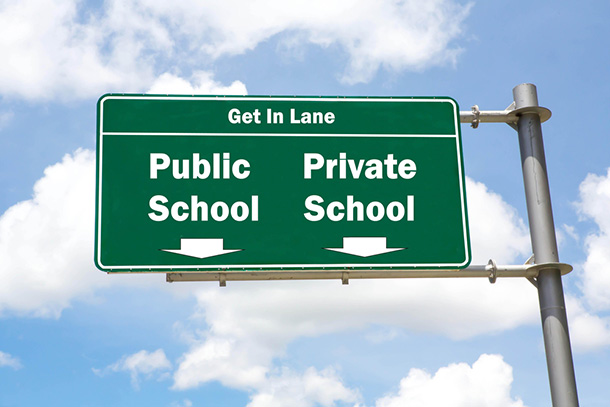We don't talk much about two-tier education.
Two-tier health care, sure. Governments reject the idea that a sick child from a wealthy home should get better treatment than a child from a poor home.
But B.C. governments have been happy to let parents with money buy their children a big educational head start over the equally bright poor kid a few neighbourhoods away.
And the BC Liberals -- like the New Democrats and Socreds before them -- insist that less-affluent taxpayers subsidize the private schools they can't afford for their own children.
But recent (albeit flawed) polls and a policy shift from NDP leader John Horgan could signal a long overdue change.
B.C. is one of five provinces that provide a taxpayer subsidy to private schools. The formula is simple. Government funding for public schools next year will average about $8,960 per student.
Private schools are eligible for two levels of funding. Schools that spend the same or less than the local public district on each student get 50 per cent of the public school grant, about $4,480. Think of a co-op Montessori school, or small religious school.
Private schools that spend more per student than the public district get 35 per cent of the grant to public schools -- about $3,136 per pupil.
Subsidizing the elite
But why are taxpayers subsidizing posh private schools, when the government insists the public system is meeting students' needs?
St. George's School is among the elite B.C. private schools. Tuition starts at $20,460. Based on the school's budget, it spends about $34,000 per student, almost four times as much as the provincial funding for students in public schools.
Yet taxpayers will subsidize St. George's with more than $3 million this year.
It's hard to think of a single argument for this policy. Defenders of the status quo argue that if private school students all returned to the public system, taxpayers would have to pick up the full cost, not just 35 or 50 per cent. But it's a phony argument; the private schools -- especially the ones targeting the affluent -- would just raise the tuition to offset the shortfall. (St. George's even acknowledges the possibility that public funding could end in its information for prospective clients.)
And there are a bunch of arguments against the subsidies to promote private education.
First, they undermine a basic principle of Canadian society. Public education is supposed to be the great leveller. Children in affluent families inevitably have advantages, from broader experiences to better diets.
But a quality public school system is supposed to give every child the chance to make the most of his or her potential. A kid from a poor family should have access to the same educational opportunities as the rich kids across town.
A two-tier education system erases that promise. You can be the smartest, hardest-working Grade 3 student in your school, racing through books, crazy for math. But you aren't going to have the same opportunities as a kid over at St. George's. (And you're probably going to think it's because you're not as smart.)
Second, two-tier education undermines the public system. In the 1994/95 school year, about eight per cent of students were enrolled in private schools. Twenty years later, 13 per cent of students had abandoned the public system. Public school enrolment shrunk by 8.1 per cent, while private school enrolment increased by 53 per cent.
The government's job is to provide quality public education. Each year, more parents are saying that it isn't fulfilling its responsibility.
The loss of students has added to the challenges for school districts already coping with declining enrolments due to demographic changes.
Public system losing allies
And it has meant the public system has lost the parents with the interest, ability and opportunity to push for a better public education. Many parents who might have demanded solutions when students lost 27 days of classes to strikes in 2014, for example, were disengaged. Their children were in class at private schools.
A March 2015 study looked at why private high school students in Canada scored higher on assessment tests and had "higher levels of academic attainment by age 23."
It wasn't that private schools offered a better education. "School resources and practices accounted for little of the differences in academic outcomes," the authors noted.
The difference was based on class -- the incomes and backgrounds of parents. Private school students had, the study found, "socio-economic characteristics positively associated with academic success." Parents tended to be university-educated themselves, and that meant all students -- not just their children -- placed higher value on educational achievement.
As those families abandon the public system, all students suffer.
In other countries, there is at least a debate about reducing the entrenched privilege that comes with two-tier education.
But in B.C. we've failed to acknowledge that two-tier education is increasing the gap between the well off and the rest and reducing social mobility. Those on top stay on top, not because of merit but because of advantages like government-subsidized private education.
And we have not considered the great loss in human potential. We all benefit when all children have a real chance to make the most of their abilities.
BC wants change
The issue might finally be getting some needed attention. Last week, CUPE BC released poll results showing 77 per cent of British Columbians oppose funding to private schools. (It was a badly worded poll, with two introductory questions pushing respondents towards that answer, but still somewhat useful.) A BC Humanist Association poll produced similar results.
More significantly, Horgan told Vaughn Palmer on Voice of BC that an NDP government would look critically at funding for private schools.
"We've been starving the public system, and the private system's been getting increasing students because parents are taking their kids out of the public system because they see it's in distress," Horgan said.
The funding formula is "broken," he said.
Parents have a right to choose the best option for their children.
But the government has a duty to develop policies that aim at providing equal opportunity for all kids in British Columbia.
Instead, four decades of governments have chosen to promote a two-tier education policy that entrenches privilege and denies too many children the chance to make the most of their abilities.
It's time for change. ![]()
Read more: Education, BC Politics
















Tyee Commenting Guidelines
Comments that violate guidelines risk being deleted, and violations may result in a temporary or permanent user ban. Maintain the spirit of good conversation to stay in the discussion.
*Please note The Tyee is not a forum for spreading misinformation about COVID-19, denying its existence or minimizing its risk to public health.
Do:
Do not: